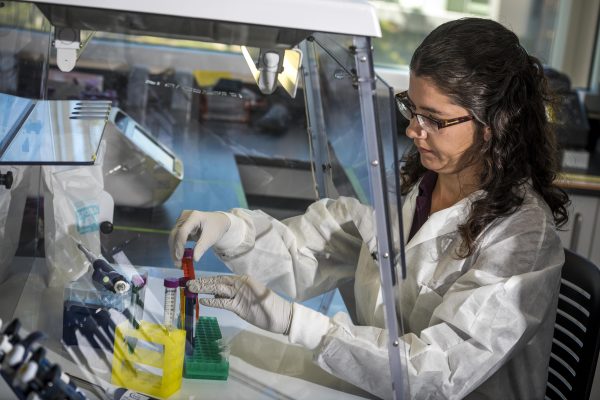Contact
Emily Cope, PhD
SHERC Research Project
Evaluating soluble fiber as a strategy to decrease asthma

In Arizona, asthma prevalence exceeds the national average and is disproportionately seen in economically disadvantaged urban populations. Cope, associate professor, Department of Biological Sciences, and her co-investigators will study childhood asthma and the effect of the gut microbiome on improving asthma symptoms.
Co-investigators include J. Gregory Caporaso, professor, Department of Biological Sciences and director of the Center for Applied Microbiome Science in the Pathogen and Microbiome Institute; Andrew Koppisch, associate professor, Department of Chemistry and Biochemistry, and interim associate vice president for Research at NAU; and graduate student Kathryn Conn.
Matthew Rank, an immunologist and pediatrician at Mayo Clinic, will oversee the clinical trial and biospecimen collection at the Phoenix Children’s Hospital Pulmonary and Asthma clinic, which includes recruiting participants, assisting with data analysis, and interpretation as well as communicating the findings from the study to the public.
Sophia Williams, pediatric pulmonologist at Phoenix Children’s Hospital, will lead research performed on the Phoenix Children’s Hospital Breathmobile (a mobile asthma clinic) along with Ryan Sidebottom, family nurse practitioner, who will administer study questionnaires.
“We leverage a strong partnership between NAU and Phoenix Children’s Hospital to learn about the relationship between nutrition and asthma so we can address disparities in asthma across Arizona,” Cope and Rank said.
According to the investigators, asthma is a complex inflammatory disease of the airways that is estimated to affect 300 million people worldwide with an additional 100 million asthma diagnoses anticipated by the year 2025. Asthma is a multifactorial disease affected by genetic and environmental factors.
While asthma affects individuals across all income brackets and ethnicities, there is a significant disparity in occurrence, illness, and mortality among people living in low-income urban areas. In addition, the pediatric gut microbiome is critical in immune development and understanding childhood asthma may have lasting beneficial effects into adulthood, according to the investigators.
The scientists will measure fiber consumption and gut microbiome composition in patients who are served by the Breathmobile, and they will recruit participants from the Phoenix Children’s Hospital to determine if changing to a high-fiber diet through fiber supplementation can alter the airway and gut microbiome composition and lead to a decrease in asthma.
Specific aims
- Quantify baseline fiber consumption and determine gut microbiome composition using a mobile asthma clinic (Breathmobile) in underserved urban locations in Maricopa County.
- Evaluate changes in asthma control, type-2 airway inflammation, gut and airway microbiome, and circulating short chain fatty acids after a 4-week intervention with soluble fiber in pediatric asthma patients.
- Determine the effect of microbiome-derived SCFAs on dendritic cell-mediated T cell polarization and eosinophil function and activation.
Giving back to the science community
According to the investigators, an essential part of their work is sharing the project’s results publicly with a community of scientists interested in gut microbiome research.
They plan to make all microbiome data available to the research community through deposition in publicly available databases and all software developed in this project will be published as open source. They will engage the community through the development of informational brochures as they gain knowledge about dietary habits and gut microbiota. They will also present their findings to the public during STEM (Science, Technology, Engineering, and Math) outreach events in Flagstaff (such as the Flagstaff Festival of Science) and Maricopa County.
Through their study, they will develop inter-institution collaborations and present their results at national scientific meetings and publications. In the future, they hope to focus on nutritional interventions for healthy food choices.
Funding: This research is supported by a NIMHD center grant to the Southwest Health Equity Research Collaborative at Northern Arizona University (U54MD012388).





